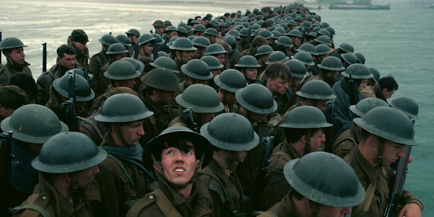The 400-Word Review: Dunkirk
By Sean Collier
July 27, 2017
Do not be surprised if Dunkirk, the historical drama from Christopher Nolan, ignites a series of imitators mining the past for action and adventure. For the film demonstrates quite succinctly that anyone focusing solely on American tales of heroism and suspense is missing out; the standard reaction among departing audiences is likely to be, “How did I not know this story until now?”
Three years after the director’s masterful Interstellar, Nolan’s first period piece explores a pivotal moment of the second World War. As the Germans drive French and British forces out of continental Europe, approximately 400,000 soldiers are pinned on a beach, surrounded on all sides; British resources are stretched thin as forces begin assembling throughout the United Kingdom in anticipation of German assault. Furthermore, large boats can’t make it to the shallow water off the beach for rescue efforts.
Nolan’s script follows the ensuing action in three arcs: the desperation and tension of the soldiers on the beach; the efforts of a civilian ship to reach the beach and provide assistance; and the trials of a pilot (Tom Hardy) engaged in a series of precise dogfights with German bombers.
The remarkable — and most notable — feature of Dunkirk, however, is the structure with which it deploys these threads. The script, written by Nolan (alone; his frequent collaborator, brother Jonathan, is absent), introduces all of its characters in the opening act — despite temporal distance between them. The beach storyline covers a week; the ship, a day; and the airborne battles, an hour. Not only do those stories converge at the film’s conclusion — which would’ve been an impressive enough feat itself — but they manage to follow the same dramatic arcs, with periods of tension and relief occurring simultaneously across three stories taking place at different times and paces.
That’s tricky. And Nolan nails it.
The performances are strong, with Hardy and Mark Rylance shining, though they’re part of a tapestry; this is certainly a film where audiences will leave discussing the overall effect rather than individual turns. Vivid cinematography (by the excellent Hoyte van Hoytema) and a fine Hans Zimmer score add to Dunkirk’s impact.
If the film has any drawbacks, it is perhaps that it is so precise — so impossibly impressive — that its emotional impact is slightly lessened. That shouldn’t be taken as a deterrent, however; Dunkirk is an undeniably great work.
My Rating: 9/10
Sean Collier is the Associate Editor of Pittsburgh Magazine and a member of the Broadcast Film Critics Association. Read more from Sean at pittsburghmagazine.com/afterdark




